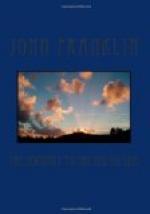July 25.
We had constant rain with thunder during the night. The nets furnished only three salmon-trout. We attributed the want of greater success to the entrance of some seals into the mouth of the river. Embarking at six A.M. we paddled against a cold breeze until the spreading of a thick fog caused us to land. The rocks here consisted of a beautiful mixture of red and gray granite, traversed from north to south by veins of red felspar which were crossed in various directions by smaller veins filled with the same substance.
At noon the wind coming from a favourable quarter tempted us to proceed, although the fog was unabated. We kept as close as we could to the main shore but, having to cross some bays, it became a matter of doubt whether we had not left the main and were running along an island. Just as we were endeavouring to double a bold cape the fog partially cleared away and allowed us an imperfect view of a chain of islands on the outside, and of much heavy ice which was pressing down upon us. The coast near us was so steep and rugged that no landing of the cargoes could be effected and we were preserved only by some men jumping on the rocks and thrusting the ice off with poles. There was no alternative but to continue along this dreary shore seeking a channel between the different masses of ice which had accumulated at the various points. In this operation both the canoes were in imminent danger of being crushed by the ice which was now tossed about by the waves that the gale had excited. We effected a passage however and, keeping close to the shore, landed at the entrance of Detention Harbour at nine P.M., having come twenty-eight miles. An old Esquimaux encampment was traced on this spot, and an ice chisel, a copper knife, and a small iron knife were found under the turf. I named this cape after Mr. Barrow of the Admiralty to whose exertions are mainly owing the discoveries recently made in Arctic geography. An opening on its eastern side received the appellation of Inman Harbour after my friend the Professor at the Royal Naval College, Portsmouth, and to a group of islands to seaward of it we gave the name of Jameson in honour of the distinguished Professor of Mineralogy at Edinburgh.
We had much wind and rain during the night and by the morning of the 26th a great deal of ice had drifted into the inlet. We embarked at four and attempted to force a passage, when the first canoe got enclosed and remained for some time in a very perilous situation: the pieces of ice, crowded together by the action of the current and wind, pressing strongly against its feeble sides. A partial opening however occurring we landed without having sustained any serious injury. Two men were then sent round the bay and it was ascertained that, instead of having entered a narrow passage between an island and the main, we were at the mouth of a harbour having an island at its entrance, and that it was necessary




